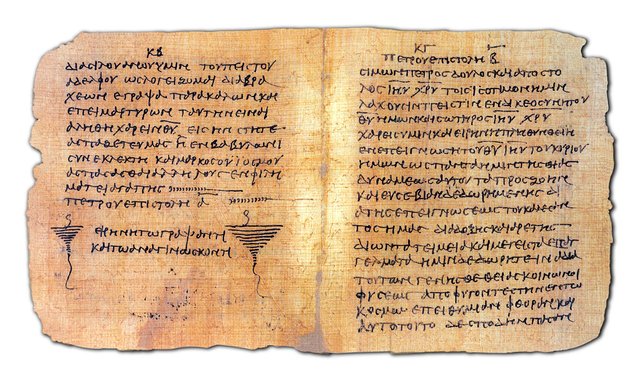Romance novels and gospels
Censorship regulations are also known by Julian, but these refer only to the pagan priesthood. As pontiff Maximus, as the spiritual head of the empire, he wrote in a missive what the pious servant of the gods has to read and what not. Homer and the philosophers: yes - cheeky scoffers like the poet Archilochos: better not. "Love stories and all such novels are basically to be rejected. Such reading is not for a devotee of the gods. Because they kindle the desires and passions, which one must guard against. "Instead, Emperor Julian recommends to read hymns of the gods and to learn by heart. The Greco-Roman novel, which Emperor Julian uses here - at least for the priesthood - on the index, was the favorite reading especially of the big city audience in the Roman Empire. There was exoticism and eroticism, adventure and a happy ending. The fragment of a Roman papyrus from Egypt has illustrations in each of the text columns. Perhaps this was intended as an aid to inexperienced readers, according to the motto: And those who can not read, look at the pictures. In the second and third centuries AD the novels were mostly written on a codex - the majority of the readers apparently accepted this book form.
The Christians also used the Codex. He was better served as a role in the liturgy and given a more representative form. Christianity was a book religion, and so this book had to reflect its sublime content in worship. The parchment sheets were well suited to the illumination of the book, which unfolded and made the evangeliare unique works of art. And what became of the Greek and Roman classics? Fortunately, after the victory of Christianity, it was not the iconoclasts but the more discreet spirits who sought to preserve the cultural heritage of paganism. Thus, the ancient texts were taken to the monastery libraries and collected there and further written off. Of course, for them the word was: Habent sua fata libelli - The books have their destinies. In times when the parchment was scarce and expensive, some manuscripts scraped the ancient text with a knife and rewritten it. The result was a palimpsest, the "rewritten". In modern times, ways have been found to make the scratched writing visible again.
Thus, under a collection of psalms, Cicero's "De re publica" came to light. Particularly threatening were those texts that were not read at school and that were not considered objects of monastic edification. Thus, especially the novels were endangered, which had already been set by the pagan Emperor Julian on the index - of course, no reading for a devout monastic brother. Now the Greek romance novel "Daphnis and Chloe" is handed down to us in a version from the 13th century, in a very tiny font and an unusually small format. And in any case, at the beginning as well as at the end there are edifying texts of the Fathers of the Church. With how much luck so many lost believed Codex was saved, we experience in Conrad Ferdinand Meyer's novel "Plautus in nunnery". The Italian humanist Poggio, as the Alexandrians once did, resorted to methods that were not entirely legal, in order to obtain the codex of the Roman comedy poet he had picked up. But he gives it then but his friend Cosimo de Medici, who had founded the first public library in Florence since ancient times. Soon thereafter, printing was invented, and now what Martial had said so confidently came true.


history must always be remembered, because with history we can know the past.
Downvoting a post can decrease pending rewards and make it less visible. Common reasons:
Submit